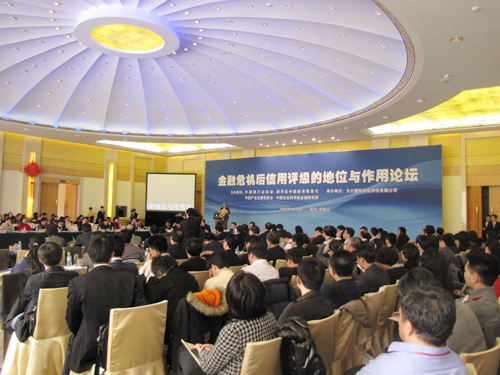|
 |
|
PASSIONATE DISCUSSIONS: Scholars and representatives from financial institutions participate in a forum on the role of credit rating agencies sponsored by Dagong Global Credit Rating Co. Ltd. in Beijing on January 10, 2009 (COURTESY OF DAGONG) |
Amid the EU's ongoing sovereign debt crisis, the current international credit rating system has been accused of aggravating the world's economic woes. Recently, Guan Jianzhong, Chairman of the Board and President of the Beijing-based Dagong Global Credit Rating Co. Ltd., spoke to Beijing Review reporter Yu Yan about reforms in the current international credit rating system and Dagong's role. Dagong is the first non-Western rating agency to assess the world's sovereign credit and risks.

Beijing Review: What's your take on the current international credit rating system?
Guan Jianzhong: The current international credit rating system is monopolized by three U.S.-based agencies: Moody's, Standard & Poor's and Fitch. The whole global financial market is using the credit rating information they provide. However, the disadvantages of this system have been exposed since the outbreak of the global financial crisis in 2008.
The biggest problem with the current system is that the global credit rating responsibilities are taken by agencies from one single country. There's no effective supervision from the international community.
Moreover, the existing competition mechanism causes credit rating agencies to abandon their principles and give false credit ratings. These agencies depend on providing ratings for their survival, while debt issuers tend to hire the agency that can give them the highest rating. The rating therefore may not be able to show risks accurately.
The three dominating agencies' credit rating criteria are formed based on U.S. values and ideology. When they measure the whole world's credit risks with one single country's values and ideology, they will surely yield incorrect and biased results.
This partly explains how the global financial crisis broke out. The relationship between the lender and the borrower, or the credit relationship, is the foundation of the U.S. economy. A balanced and steady credit relationship relies on credit rating information. If the problems of the current credit rating system cannot be solved and the world continues to use the false information provided by the three dominating agencies, another financial crisis is all but certain.
In your view, how should the current international credit rating system be reformed?
In April 2009, the Group of 20 Summit in London proposed to strengthen supervision over credit ratings for the first time. As far as I see it, such international supervision is difficult to implement. It is unlikely to solve the problems of the existing credit rating system, either. What's more, in 2010, U.S. President Barack Obama announced a financial reform bill, trying to solve problems within the existing framework. His efforts, too, failed.
Now the only way out is to build an entirely different international credit rating system. In my opinion, it should consist of international credit rating agencies, universally recognized rating criteria and a global supervision system.
This new system should be non-sovereign. The whole world's credit rating responsibilities cannot be accounted for by one single country.
Moreover, the current borrower-dominated system should be changed into a lender-dominated one. Currently, the credit rating system is dominated by the world's biggest borrower: the United States. The rating given by the three leading credit rating agencies to the United States is higher than the ratings of its lenders. This obvious unfairness leads to a severe imbalance in the world's credit relationship.
For instance, China exports products and gets dollars as payment. And then it lends the dollars to the United States. These dollars are the value created by China. While monopolizing the world's credit resources, the United States and other major borrowers do not contribute greatly to the growth of the world economy, but use these resources to satisfy their consumption needs.
| 